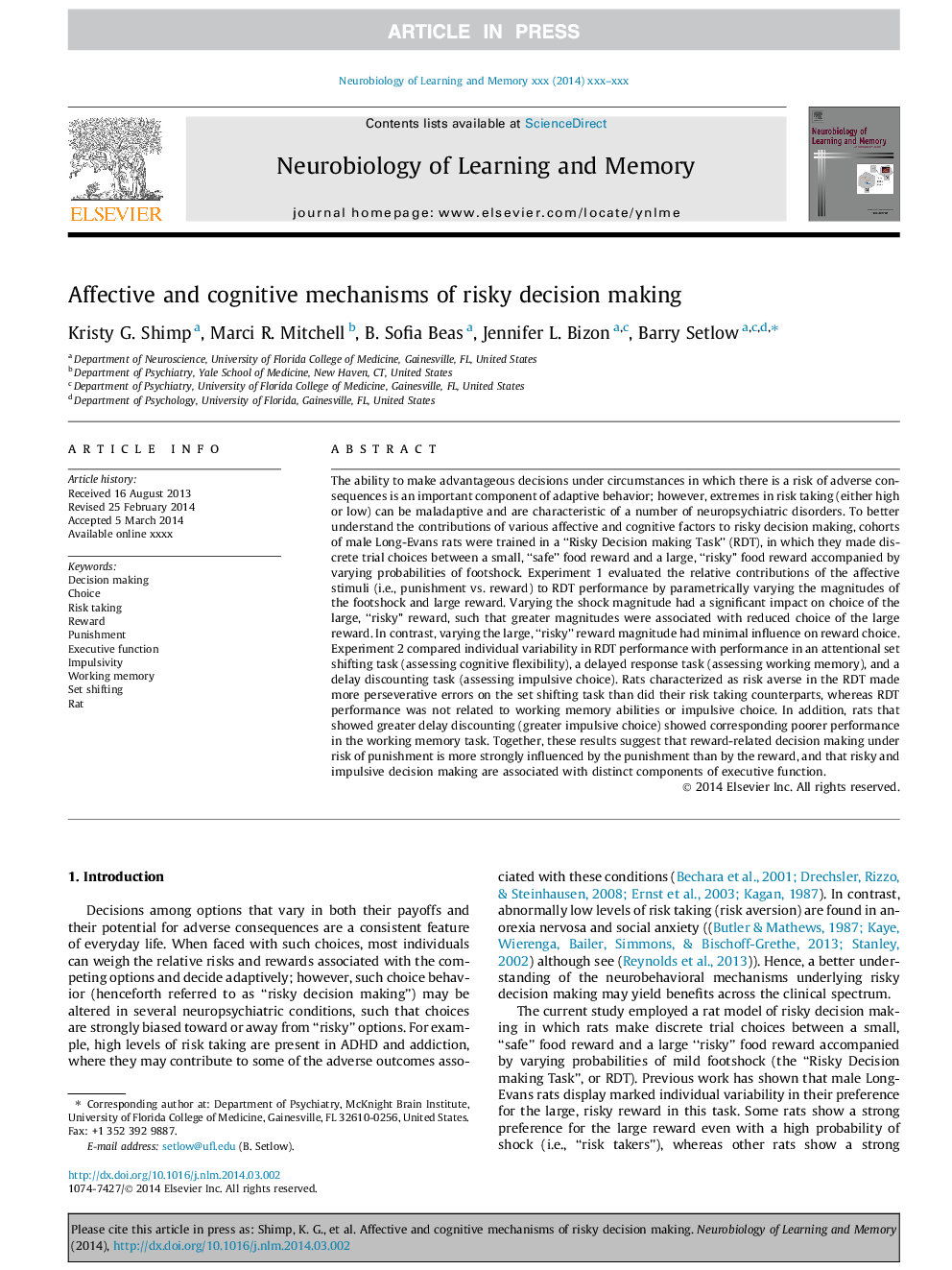| کد مقاله | کد نشریه | سال انتشار | مقاله انگلیسی | نسخه تمام متن |
|---|---|---|---|---|
| 7299800 | 1475158 | 2015 | 11 صفحه PDF | دانلود رایگان |
عنوان انگلیسی مقاله ISI
Affective and cognitive mechanisms of risky decision making
ترجمه فارسی عنوان
مکانیزم های مؤثر و شناختی تصمیم گیری ریسک پذیر
دانلود مقاله + سفارش ترجمه
دانلود مقاله ISI انگلیسی
رایگان برای ایرانیان
کلمات کلیدی
تصمیم سازی، انتخاب ریسک پذیری، جایزه، مجازات، عملکرد اجرایی، تکانشی، حافظه کاری، تنظیم تغییر، موش
موضوعات مرتبط
علوم زیستی و بیوفناوری
علم عصب شناسی
علوم اعصاب رفتاری
چکیده انگلیسی
The ability to make advantageous decisions under circumstances in which there is a risk of adverse consequences is an important component of adaptive behavior; however, extremes in risk taking (either high or low) can be maladaptive and are characteristic of a number of neuropsychiatric disorders. To better understand the contributions of various affective and cognitive factors to risky decision making, cohorts of male Long-Evans rats were trained in a “Risky Decision making Task” (RDT), in which they made discrete trial choices between a small, “safe” food reward and a large, “risky” food reward accompanied by varying probabilities of footshock. Experiment 1 evaluated the relative contributions of the affective stimuli (i.e., punishment vs. reward) to RDT performance by parametrically varying the magnitudes of the footshock and large reward. Varying the shock magnitude had a significant impact on choice of the large, “risky” reward, such that greater magnitudes were associated with reduced choice of the large reward. In contrast, varying the large, “risky” reward magnitude had minimal influence on reward choice. Experiment 2 compared individual variability in RDT performance with performance in an attentional set shifting task (assessing cognitive flexibility), a delayed response task (assessing working memory), and a delay discounting task (assessing impulsive choice). Rats characterized as risk averse in the RDT made more perseverative errors on the set shifting task than did their risk taking counterparts, whereas RDT performance was not related to working memory abilities or impulsive choice. In addition, rats that showed greater delay discounting (greater impulsive choice) showed corresponding poorer performance in the working memory task. Together, these results suggest that reward-related decision making under risk of punishment is more strongly influenced by the punishment than by the reward, and that risky and impulsive decision making are associated with distinct components of executive function.
ناشر
Database: Elsevier - ScienceDirect (ساینس دایرکت)
Journal: Neurobiology of Learning and Memory - Volume 117, January 2015, Pages 60-70
Journal: Neurobiology of Learning and Memory - Volume 117, January 2015, Pages 60-70
نویسندگان
Kristy G. Shimp, Marci R. Mitchell, B. Sofia Beas, Jennifer L. Bizon, Barry Setlow,
